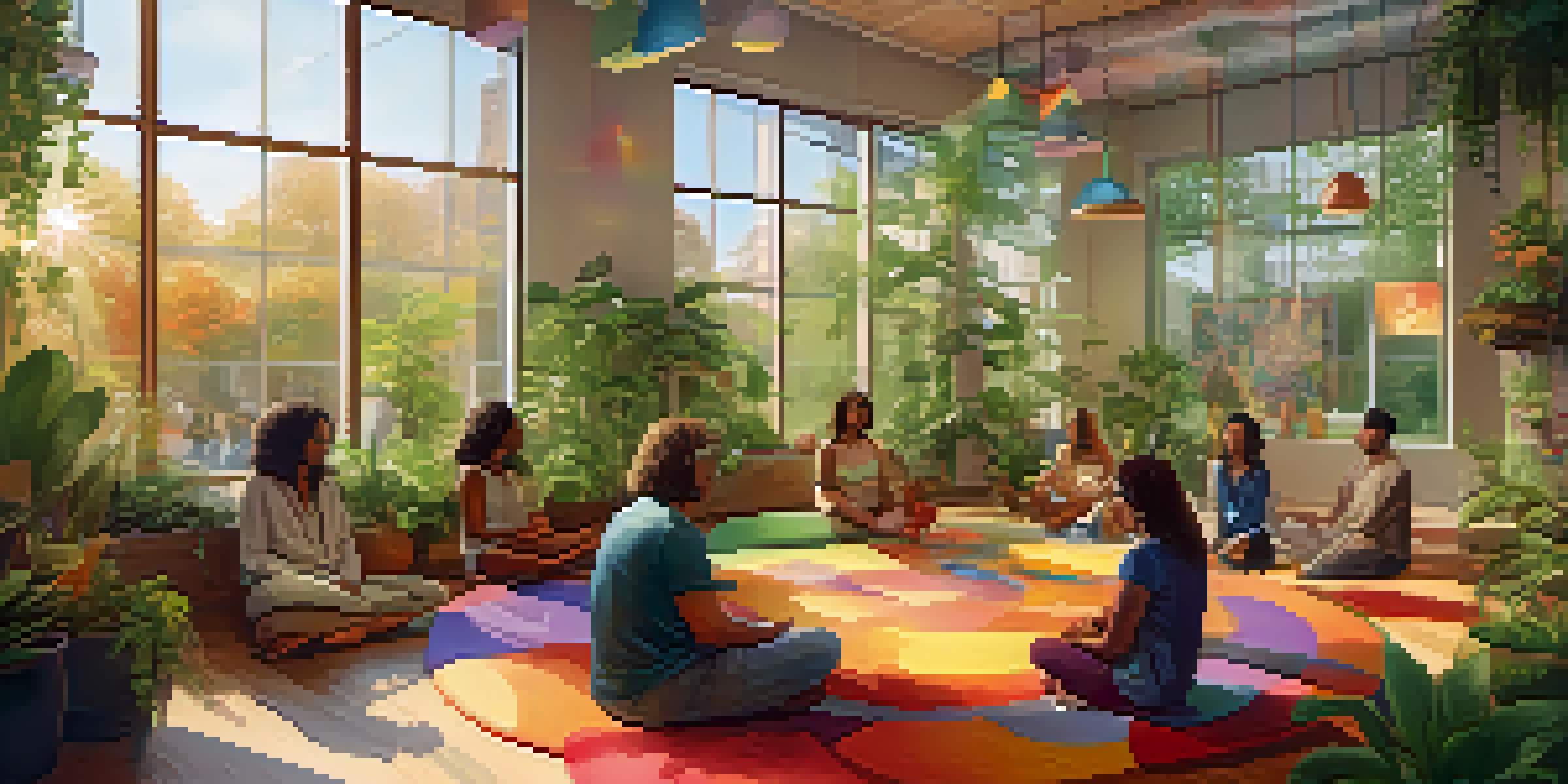Psychedelics in Urban Communities: A Path to Equity

Understanding Psychedelics and Their Potential Benefits
Psychedelics are substances that alter perception, mood, and cognitive processes. Common examples include psilocybin, found in mushrooms, and MDMA. These substances have garnered attention for their potential therapeutic benefits, particularly for mental health issues like depression and PTSD.
The mind is everything. What you think you become.
In urban communities, where access to mental health resources may be limited, psychedelics can offer unique opportunities for healing. They can facilitate profound personal insights and emotional breakthroughs, often in a single experience. This potential has led many to advocate for their decriminalization and responsible use.
Moreover, the growing body of research highlights the importance of set and setting—essentially, the mindset of the user and the environment in which they take psychedelics. By fostering safe, supportive spaces for these experiences, urban communities can harness the power of psychedelics for collective healing.
The Historical Context of Psychedelics in Urban Areas
Historically, psychedelics have been intertwined with cultural practices and social movements. In urban settings, these substances were often associated with counterculture movements, leading to stigmatization and criminalization. This historical context has shaped public perception and policy around psychedelics.

As urban communities grapple with the aftermath of the War on Drugs, it’s crucial to recognize how these policies disproportionately affected marginalized populations. The criminalization of psychedelics has not only hindered potential therapeutic use but also perpetuated cycles of trauma within these communities.
Psychedelics Aid Mental Health
Psychedelics can provide impactful therapeutic benefits for mental health issues, particularly in urban communities with limited resources.
Revisiting this history allows us to advocate for a more equitable future, where the benefits of psychedelics can be accessible to all. It’s about reclaiming these substances for healing rather than punishment, promoting a narrative of restoration rather than repression.
Psychedelics and Mental Health in Urban Communities
Urban communities often face high levels of stress, anxiety, and depression due to socioeconomic factors. With limited access to mental health services, individuals may feel isolated in their struggles. Psychedelics present a novel approach to mental health care, offering quick and impactful interventions.
Psychedelics can help us see the world as it is, beyond the filters of our conditioning.
Research indicates that psychedelics can induce experiences of interconnectedness and empathy, which are crucial for healing. For example, individuals often report feeling more connected to others and the world around them after a psychedelic experience. This shift in perspective can be particularly beneficial in urban settings, where social isolation can be prevalent.
By integrating psychedelics into community mental health strategies, urban areas may witness a transformative change. Imagine community centers offering guided psychedelic sessions, fostering both individual and collective healing, ultimately reducing the stigma attached to mental health struggles.
Equity and Access to Psychedelic Therapies
Equity in healthcare is a fundamental principle, yet access to psychedelic therapies is often limited by socioeconomic status. Many individuals in urban communities may lack the financial resources to participate in traditional psychedelic therapy programs. This raises important questions about fairness and inclusivity.
To address this issue, community-based initiatives can play a vital role. These programs can provide low-cost or free access to psychedelic therapy, utilizing trained facilitators from within the community. This not only enhances access but also empowers individuals to take charge of their healing journeys.
Equity in Access to Therapies
Community-based initiatives are essential for ensuring equitable access to psychedelic therapies for underserved populations.
Moreover, fostering diversity in the field of psychedelic therapy is essential. By including voices from various backgrounds, we can ensure that the benefits of these substances are shared equitably among all community members, breaking down barriers that historically marginalized groups face.
Building Safe Spaces for Psychedelic Experiences
Creating safe spaces for psychedelic experiences is crucial for their therapeutic potential. In urban communities, this means establishing environments that are supportive and nurturing, allowing individuals to explore their consciousness freely. Safety can significantly impact the outcomes of these experiences.
Supportive group settings, guided by trained facilitators, can enhance the healing process. These spaces can foster trust, allowing participants to share their experiences openly. The community aspect also encourages a sense of belonging, which is particularly important in urban areas where isolation can be common.
Additionally, integrating cultural practices into these spaces can help bridge the gap between traditional healing and modern psychedelic therapy. By honoring the cultural significance of these substances, urban communities can create spaces that resonate deeply with their members, enhancing the overall healing experience.
Advocacy and Policy Change for Psychedelic Equity
Advocacy plays a critical role in shaping the future of psychedelics in urban communities. Grassroots movements can push for policy changes that prioritize equity in access to psychedelic therapies. By mobilizing community members, advocates can amplify their voices and demand fair treatment under the law.
Policy change is necessary to decriminalize psychedelics, allowing for safe and regulated use. This can pave the way for research and clinical trials focused on diverse populations, ensuring that all voices are heard. It’s about creating a legal framework that supports healing rather than hindering it.
Creating Safe Healing Spaces
Establishing supportive environments for psychedelic experiences is crucial for maximizing their therapeutic potential in urban settings.
Moreover, engaging local leaders and policymakers in conversations about the potential benefits of psychedelics can foster a more informed public discourse. As urban communities continue to advocate for their rights, the conversation around psychedelics can evolve, leading to more inclusive policies that reflect the needs of all community members.
The Future of Psychedelics in Urban Communities
The future of psychedelics in urban communities holds immense potential for healing and growth. As more cities begin to recognize the therapeutic benefits of these substances, we can anticipate a shift in public perception and policy. This could lead to widespread access to safe and effective psychedelic therapies.
Imagining a future where community centers offer psychedelic-assisted therapy as a standard practice is not far-fetched. With ongoing research and advocacy, urban communities could become hubs for innovative mental health care, setting an example for others to follow. The goal is to create an environment where everyone can benefit from these powerful tools.

Ultimately, the journey toward equity in psychedelic access is a collective effort. By fostering community involvement and prioritizing the needs of marginalized populations, urban areas can pave the way for a brighter, more inclusive future where healing is accessible to all.